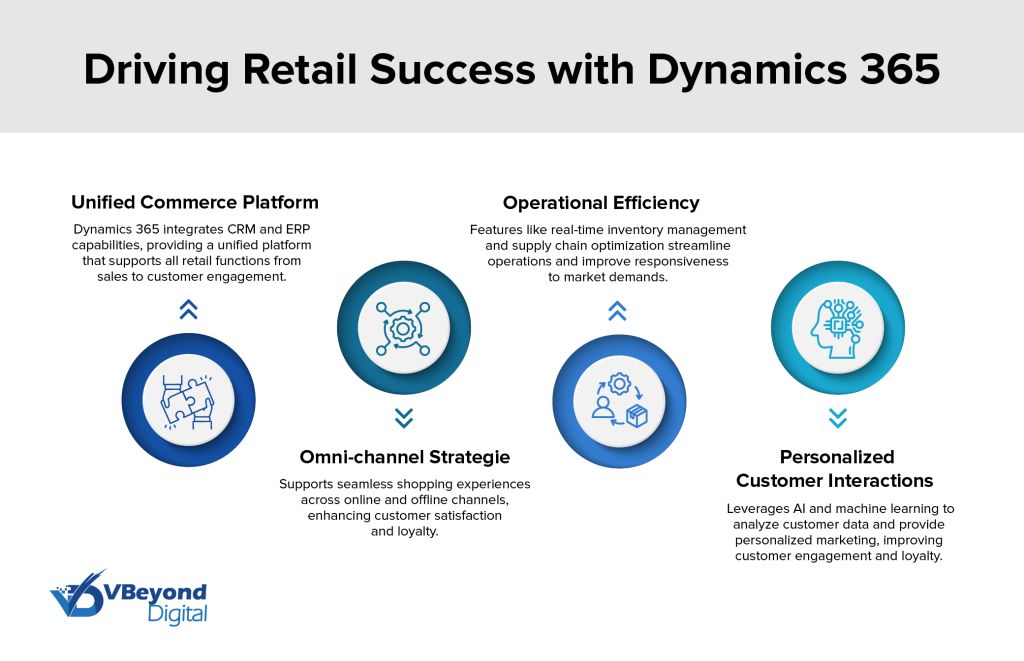Dynamics 365 Commerce for Retail: Building a Unified Commerce Platform
Table of Contents
- Core Capabilities of Dynamics 365 for Omni-channel Retail Operations
- How It Integrates All Sales Channels from Physical Stores to Digital Platforms
- Enhancing Customer Experience with Unified Data
- Personalizing Customer Interactions
- Streamlining Operations with Advanced Technology
- How These Efficiencies Support Omni-channel Demands
- The Use of AI in Dynamics 365 to Adapt to Market Changes and Consumer Behavior
- Case Study: Transforming Retail with Dynamics 365
- Future Trends in Omni-channel Retailing
- Conclusion
In today’s retail sector, combining online and physical shopping operations is key. “Dynamics 365 Commerce for Retail: Building a Unified Commerce Platform” provides an in-depth examination of how Dynamics 365 Commerce can anchor retailers aiming to create an integrated commerce strategy. This guide details the software’s capabilities in uniting various shopping channels, simplifying inventory management, and enhancing personalized customer interactions. Readers will learn how the platform supports a consistent flow of retail activities, from product browsing and purchasing to fulfillment and customer service, ensuring a uniform brand experience across all channels. This resource is aimed at retail leaders looking to improve their operations and boost customer satisfaction in a competitive market.
Microsoft Dynamics 365 has evolved into one of the most powerful cloud-first ERP platforms bringing pivotal systems for supply chain management, sales, retail operations, finance, and payments on a single, integrated interface. As far as retail management software goes, Dynamics 365 Commerce addresses the complexities of modern retail environments. As an integral part of Microsoft’s suite of cloud-based applications, deploying Dynamics 365 for retail amalgamates customer relationship management (CRM) and enterprise resource planning (ERP) capabilities. This integration facilitates a holistic approach to managing business processes ranging from supply chain operations to customer engagements.
In the present context of multi-channel retail operations, achieving a unified commerce platform is more crucial than ever. Consumers demand a connected shopping experience across online and offline channels. Retailers that implement effective omni-channel strategies enhance customer satisfaction and increase loyalty by providing consistent, tailored interactions across all platforms. Dynamics 365 Commerce, the key solution in the suite for retail operations, plays a critical role in enabling these strategies by offering tools that support a unified view of the customer journey, thus facilitating a seamless shopping experience.
Core Capabilities of Dynamics 365 for Omni-channel Retail Operations
Dynamics 365 Commerce is engineered to be an all-inclusive retail management software that integrates all facets of a retail operation into a singular, accessible platform. It supports retailers in creating, managing, and maintaining digital and physical stores, providing a consistent customer experience across all touchpoints. Dynamics 365 Commerce features include real-time inventory management, pricing, and promotions across channels, which are essential for maintaining the integrity of a unified commerce platform.
How It Integrates All Sales Channels from Physical Stores to Digital Platforms
One of the key strengths of implementing Dynamics 365 for retail operations management is its ability to integrate sales channels seamlessly. Whether it’s a physical storefront or an online market, Dynamics 365 ensures data consistency and process uniformity. This integration allows retailers to offer customers a truly omni-channel shopping experience, where changes made in one channel are instantly reflected across others. This capability not only streamlines operations but also enhances customer satisfaction by providing reliable and up-to-date information regardless of how or where a customer chooses to shop.
Boost omni-channel success and drive unified experiences.
Enhancing Customer Experience with Unified Data
The Role of Dynamics 365 in Delivering Seamless Customer Experience Across All Touchpoints
Dynamics 365 excels in creating a seamless shopping experience by leveraging unified data across all customer interactions. This CRM in retail collects and analyzes data from every touchpoint, whether online, in-store, or via mobile apps, allowing for a coherent view of customer behaviors and preferences. This integrated data environment enables retailers to offer consistent service and product availability, essential for customer experience optimization.
Case Studies on Data Integration and Real-Time Customer Insights
Case Study 1: Chipotle – Personalizing Customer Interactions with Dynamics 365
Problem: Chipotle Mexican Grill, renowned for its customizable food options, faced challenges in tailoring its marketing efforts due to the lack of a comprehensive platform to organize and interpret its vast customer data.
Solution: Chipotle adopted Microsoft Dynamics 365 Customer Insights to consolidate and utilize its customer data effectively. This platform enabled Chipotle to segment its customers accurately and deliver personalized marketing communications, enhancing customer engagement.
Benefit: The implementation of Dynamics 365 allowed Chipotle to provide targeted offers and communications that resonated with individual customer preferences, significantly boosting customer satisfaction and brand loyalty. This strategic approach helped Chipotle to not only meet but exceed customer expectations in service personalization.
For more details on Chipotle’s use of Dynamics 365, you can read the full story here.
Case Study 2: Chateau Ste. Michelle – Enhancing Consumer Experience through Unified Commerce
Problem: Chateau Ste. Michelle, one of the largest premium wine companies in the U.S., needed to unify its consumer data across all its wine brands to provide better mobile experiences and innovate in consumer engagement.
Solution: The winery implemented Microsoft Dynamics 365 Commerce to integrate consumer data across various touchpoints, providing a seamless consumer experience regardless of the shopping channel. This solution allowed for consistent and personalized interactions across all platforms.
Benefit: By using Dynamics 365 Commerce, Chateau Ste. Michelle achieved a significant improvement in mobile customer interactions and was able to innovate in its marketing and sales strategies. This resulted in enhanced customer engagement, increased sales, and a stronger brand presence in the competitive wine market.
Explore more about how Chateau Ste. Michelle transformed its consumer experience with Dynamics 365 here.

Personalizing Customer Interactions
How Dynamics 365 Enables Personalized Marketing and Customer Engagement Through AI and Machine Learning
Dynamics 365 employs advanced AI and machine learning algorithms to drive personalized marketing and customer engagement. These technologies analyze vast amounts of data to identify patterns in customer behavior, preferences, and purchasing history. By doing so, Dynamics 365 enables retailers to craft highly targeted marketing campaigns and recommendations that resonate on an individual level.
Examples of Personalized Campaigns and Their Impact on Customer Loyalty
1. Michael Hill: Personalized Customer Experiences Michael Hill, an international jeweler, implemented Dynamics 365 to transform their digital retail experiences. By using Dynamics 365, they were able to personalize customer interactions based on individual customer data collected across various channels. This personalized approach helped them improve customer engagement and increase sales. The full case study can be read on Microsoft’s website: Michael Hill Case Study
2. Dr. Martens: Enhancing Consumer Connection Dr. Martens leveraged Dynamics 365 to gain a better understanding of their customers’ preferences and shopping behavior, enabling them to send more targeted communications and promotions. This strategic use of customer data led to enhanced customer loyalty and an increase in customer lifetime value. Details of their strategy and success are documented in the following case study: Dr. Martens Case Study
Streamlining Operations with Advanced Technology
Operational Efficiencies Gained Through Dynamics 365, Such as Inventory Management and Supply Chain Optimization
Dynamics 365 Commerce incorporates advanced technologies to streamline operations across the retail spectrum. The platform’s robust inventory management system ensures that stock levels are maintained accurately across all channels, preventing overstocking or stockouts and facilitating quick responses to market demands. Similarly, supply chain optimization tools within Dynamics 365 provide real-time visibility into supply chain operations, enabling proactive management and efficient logistics.
How These Efficiencies Support Omni-channel Demands
The integration of these operational technologies supports the demands of an omni-channel strategy in retail by ensuring that customer-facing and backend processes are synchronized. For instance, when a customer orders a product online to pick up in-store, Dynamics 365 can immediately update inventory levels and inform the supply chain to replenish the stock, if necessary. This not only ensures a seamless shopping experience for the customer but also optimizes inventory turnover and reduces waste.
These operational efficiencies are critical in today’s retail environment where speed, accuracy, and customer satisfaction dictate market success. Dynamics 365 for retail’s ability to integrate and automate these processes makes it an invaluable tool for retailers aiming to achieve excellence in omni-channel retailing.
The Use of AI in Dynamics 365 to Adapt to Market Changes and Consumer Behavior
- Unified Data Integration: Dynamics 365 enables the integration of data across various channels to provide a seamless customer experience. Retailers like GNC have successfully used Dynamics 365 to create a unified view of customer data that updates in real-time, leveraging AI to segment customers effectively and enhance communication strategies. This approach allows for precise targeting and better customer relationship management.
- Leveraging AI and Copilot Capabilities: Dynamics 365 introduces AI-driven features like Copilot in Customer Insights, which streamline marketing and campaign management. These tools assist in generating content ideas, segmenting customers, and creating customer journeys using AI. Retailers can input campaign objectives in natural language to generate project boards that coordinate all aspects of campaign management, thus increasing efficiency and reducing time to market.
- Optimizing Order Management: The platform’s order management capabilities are designed to integrate seamlessly with existing ERP systems, improving responsiveness to market changes. This feature supports incremental advancements in digital transformation strategies for retailers, helping them maintain up-to-date inventory data and manage orders effectively across channels.
- Extending Service Capabilities: Dynamics 365 enhances customer service by offering tools that extend across various communication platforms. For instance, deploying chat widgets or SMS channels within Dynamics 365 helps businesses connect with customers more effectively, resolving inquiries quickly and boosting customer satisfaction.
Specific AI Tools within Dynamics 365 That Enhance Forecasting and Decision-Making
- Demand Forecasting: AI-driven demand forecasting tools in Dynamics 365 allow retailers to predict future sales based on historical data, current market trends, and seasonal fluctuations. This information is vital for effective inventory management and marketing planning.
- Customer Insights: The AI-powered Customer Insights tool provides a deep understanding of customer behaviors and preferences, enabling personalized customer interactions and smarter decision-making about product offerings and promotions.
- Fraud Protection: Dynamics 365 also includes AI-enhanced fraud protection capabilities that identify and mitigate potential fraud in real-time, safeguarding both the retailer and the customer from financial risks.
Case Study: Transforming Retail with Dynamics 365
In-depth Analysis of a Major Retailer’s Implementation of Dynamics 365
Gibson, the iconic guitar brand, is a standout example of Dynamics 365’s transformative impact in the retail sector. By leveraging Dynamics 365 Commerce, Gibson has streamlined internal processes and enhanced customer interactions, creating a more immersive and efficient customer experience. This integration has enabled Gibson to maintain a consistent and reliable service across all sales channels, which is crucial for customer satisfaction and business growth.
Discussion of Challenges Faced and the Solutions Provided by Dynamics 365
Challenges:
Fragmented data systems, leading to inconsistent customer experiences across various sales channels.
Inefficiencies in inventory and supply chain management, impacting the ability to meet customer demands effectively.
Solutions Provided by Dynamics 365:
Unified Commerce System: Dynamics 365 enabled Gibson to integrate and manage all customer data and interactions across multiple platforms seamlessly, ensuring consistent customer experiences.
Enhanced Customer Insights and Inventory Management: The system provided real-time insights into customer behavior and inventory levels, allowing for better stock management and personalized customer interactions.
Future Trends in Omni-channel Retailing
Predictions for the Future of Retail and How Dynamics 365 is Poised to Support These Trends
As the retail sector continues to evolve, several key trends are expected to shape its future. These include increased reliance on AI and machine learning for predictive analytics, heightened emphasis on sustainability in supply chains, and further blurring of the lines between physical and digital shopping experiences. Dynamics 365 is well-equipped to support these trends through its scalable architecture and continuous updates focused on incorporating the latest technological advancements.
Upcoming Features in Dynamics 365 That Will Further Support Omni-channel Strategies
Microsoft is continuously enhancing Dynamics 365 with new features that support the demands of modern retail. Upcoming updates include:
- Enhanced AI Capabilities: These will provide even more accurate forecasting and customer insights, allowing retailers to stay ahead of consumer trends and market shifts.
- Greater Integration with IoT: Integration with Internet of Things (IoT) technology will improve the tracking and management of inventory, enabling even more efficient operations across all channels.
- Sustainability Tracking: New features will help retailers track and manage their sustainability efforts, an increasingly important factor for consumers.
Conclusion
By providing a unified commerce platform using Dynamics 365 for Retail, by embodying an omni-channel strategy in retail, ensures a seamless shopping experience for customers across all channels. The platform’s integration of CRM in retail with advanced analytics and AI empowers retailers to optimize customer experience, streamline operations, and adapt swiftly to market changes. These capabilities make Dynamics 365 an essential tool for modern retail management. With Dynamics 365, retailers are well-equipped to navigate the complexities of the modern retail environment and achieve sustainable success.




